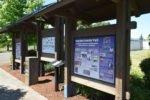Oregon State Chamber of Commerce 2021 Legislative Report
The 2021 Oregon State Legislative Session has been completed. The Oregon State Chamber of Commerce (OSCC) Legislative Council has prepared a review of the session – detailing key legislation that the OSCC tracked throughout the entirety of the session. The review includes short summaries of each bill, whether the OSCC testified, and the final fate of the legislation. The link to the full document can be found here: OSCC Legislative Report – 2021. Below, we have included a selection of key bills that the Springfield Chamber closely followed alongside the OSCC.
Any opinions expressed or implied are those of OSCC and do not necessarily reflect those of the Springfield Chamber or its representatives.

Public Affairs Counsel was pleased to advocate and monitor the following issues for the Oregon State Chamber of Commerce during the 2021 Oregon legislative session. This is a recap of issues that were identified as top legislative issues of concern for the Main Street Business Communities throughout Oregon.
Taxes
Pass-Through Entity Tax Changes (SB 139): SB 139 would eliminate the reduced tax rate for pass- through entities with more than $5 million in annual net income. Businesses with less than $500k in net income would get a tax reduction from 7.2% to 7%. And businesses with net income between $500k and $1 million would see a rate reduction from 7.6% to 7.5%.
All businesses – in order to qualify for the lower tax rates – would be subject to an owner-employee ratio test or a three-year average limitation on distributions of income as a percentage of ordinary business income. Overall, the bill raises approximately $30 million in tax revenue at time when state government is flush with revenue.
- Final Outcome: SB 139 passed into law.
Unemployment Tax Reduction (HB 3389): HB 3389 responded to the “sticker shock” of 2021 Unemployment Insurance Tax bills by: (1) omitting 2020 and 2021 from being factored into UI Trust Fund solvency requirements, (2) using 2020 employer experience ratings as the baseline experience ratings for 2022, 2023 and 2024, (3) reducing UI Trust Fund adequacy requirements by 10%, (4) allowing employers to defer up to 1/3rd of taxes due until June 30, 2022, and allowing forgiveness of those deferred taxes based on the severity of their 2021 rate increases.
- Final Outcome: HB 3389 saves employers $84 million in the immediate term, and over $2 billion over the long term. The measure was considered urgent by both parties to bring relief to employers who experienced significant increases in their UI tax bills due to layoffs stemming from the pandemic and related business closures. HB 3389 was passed into law with strong bipartisan majorities.
Taxation of PPP Loans (HB 2253 / SB 137 -2 / HB 2457 -1): Several bills and amendments emerged that would have levied taxes or surcharges on forgiven federal Paycheck Protection Program loans. OSCC was surprised to see certain legislators make these proposals as the PPP was a federal program that did not involve any state expenditures. OSCC testified and lobbied against these proposals vigorously.
- Final Outcome: All proposals to tax PPP loans eventually died as businesses pushed back forcefully and the state realized billions in unanticipated revenues from federal spending.
Local Economic Development, Housing, Recovery
Suspension of Enterprise Zone Employment Requirements (HB 2343): This bill sponsored by Representative Boshart Davis allows governing bodies of enterprise zones to suspend enterprise zone employment requirements otherwise imposed on authorized business firms for either or both of property tax years beginning on July 1, 2021, and July 1, 2022. This bill was supported by the Association of Oregon Counties. OSCC supported.
- Final Action: HB 2343 passed both chambers with just one no vote and is awaiting the Governor’s signature. It is scheduled to take effect the 91st day after adjournment.
Environmental Regulations
100% Clean Energy (HB 2021): HB 2021 was controversial as it aims to phase out natural gas as an electric generating resource in Oregon by 2040 and make Oregon’s electricity grid reliant on hydropower, solar and wind power. More specifically, HB 2021 requires electric utilities to derive their electricity from 100% clean, emissions-free sources by 2040. Many in Salem considered this legislation a follow up to Cap-and-Trade, particularly since DEQ does not have the authority to regulate the generation of electricity outside of Oregon.
- Final Outcome: HB 2021 passed on slim margins and awaits the Governor’s signature.
Recycling Reforms (SB 582): One of the major environmental bills of the session, SB 582 directs the Oregon Department of Environmental Quality (DEQ) to make changes to modernize Oregon’s recycling system and to establish statewide recycling reduction goals. Under the bill, manufacturers of covered products are required to register each product, pay a fee, and participate as a member of a producer responsibility organization (PRO). Covered products include all types of material to be used to “contain” or “protect” products—boxes, bags, takeout containers, and wrappings. The fee schedule will be determined later, as the majority of program components, including PROs are effective in 2025. According to the DEQ, the estimated costs for the program would be $83 million. These costs would be covered by manufacturers of the covered products, and then likely passed along to purchasers of the product and consumers who pay final costs for goods impacted by SB 582. OSCC opposed.
- Final Outcome: SB 582 faced significant industry opposition. Ultimately, producers were able to secure some amendments, reducing the anticipated costs of the program from $100 million to $83 million. The bill passed out of the Senate and then the House with very slim margins and awaits the Governor’s signature.
Business Liability
General COVID Liability for Employers (HB 2638): HB 2638 limited the liability for claims against employers for damages arising out of acts or omissions taken during the COVID-19 emergency period in reasonable compliance with government guidance related to COVID-19. OSCC supported.
- Final Outcome: Although it was a priority of the general business community in 2021, HB 2638 got no real traction and died in House Judiciary Committee.
Workplace, Workforce and Regulation
Oregon Family Leave Expansion (HB 2474): HB 2474 expands the Oregon Family Leave Act (OFLA) to include closure of a childcare provider or school due to a public health emergency as qualifying reasons for OFLA leave. This bill is based off of temporary BOLI rules that passed in the Spring of 2020 to expand OFLA coverage to parents who were unable to obtain childcare due to a declared state public health emergency, and as a consequence, needed to take time off of work. As amended, eligibility to take expanded OFLA leave is reduced from 180 days to 30 days, except for employees who worked for fewer than 30 days prior to the start date of OFLA leave.
- Final Outcome: HB 2474 was negotiated between employer and worker advocates, passed out of both Chambers, and was signed by the Governor.
Reasonable Accommodation for Childcare (SB 716): This law amends the statute giving employees the right to have input into work schedules (predictive scheduling). Childcare needs are stated specifically as an issue an employee may bring to the employer’s attention in setting an employee’s schedule. Under the law, an employer is not obligated to implement the employee’s requests.
- Final Outcome: SB 716 passed and was signed into law.
Discover more from Springfield Bottom Line
Subscribe to get the latest posts sent to your email.






